The way you prepare for neet can have a huge impact on its ability to score.
The National Eligibility Cum Entrance Test (NEET), formerly the All India Pre Medical Test (AIPMT) is an entrance exam for students all over India who wish to study medical/paramedical courses such as MBBS, BDS, Ayurveda, Homeopathy, Physiotherapy, Occupational therapy, Veterinary etc. Here, we'll be only focused on MBBS/BDS courses.
The Actionable Guide for NEET Medical Entrance Test
NEET is currently conducted by National Testing Agency (NTA) which provides the results to the Directorate General of Health Services at the Ministry of Health and Family Welfare. Prior to 2019, the test was administered by the Central Board of Secondary Education (CBSE) in partnership with Prometric Testing Pvt Ltd headquartered in the USA.
Mode of NEET Examination
It is an offline exam, using a pen and paper only. The candidates will have to circle their answers on the OMR sheet provided to them using a black ball point pen only. The stationary will be provided to them in the exam hall.
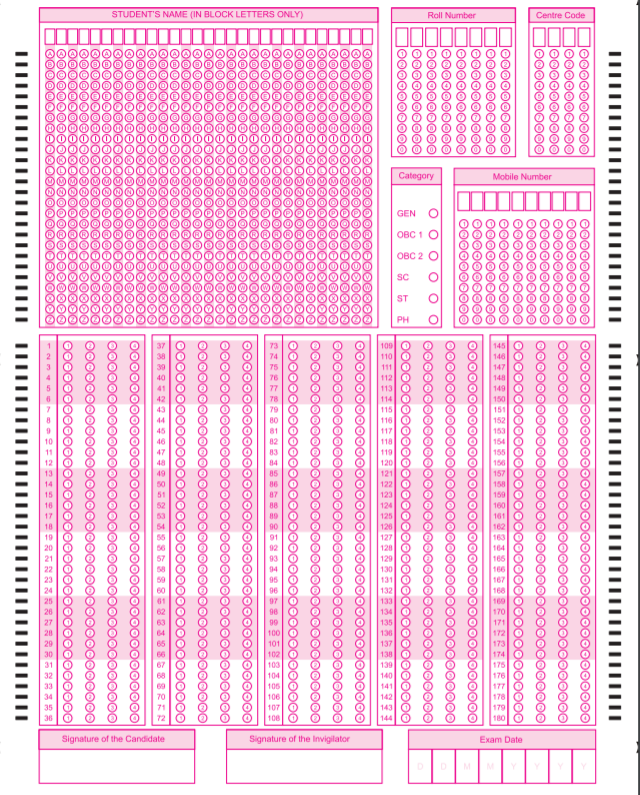
NEET Exam Time Duration
It is a three hour long paper. All the three subjects i.e Biology, Chemistry and Physics question paper will be provided to the candidates at the beginning of the exam and the candidates can attempt the paper however they want. It is suggested the candidates start with Biology as it hold the most marks (360 marks).
Official Website
www.ntaneet.nic.in is the website where the candidates can obtain their admit cards and their results.
Types of Collages & Number of Seats through NEET
| Type of Colleges | MBBS | BDS | ||
| Total Colleges | Total Seats | Total Colleges | Total Seats | |
| Government Colleges | 216 | 30,455 | 47 | 2,930 |
| Private Colleges including Deemed Universities | 247 | 36,165 | 260 | 24,130 |
| Central Universities | 2 | 151 | 2 | 88 |
| Total Seats through NEET | 465 | 66,771 | 309 | 27,148 |
Syllabus for NEET
Class 11
- Physical World and Measurement
- Kinematics
- Laws of Motion
- Work, Energy and Power
- Motion of System of Particles and Rigid Body
- Gravitation
- Properties of Bulk Matter
- Thermodynamics
- Behaviour of Perfect Gas and Kinetic Theory
- Oscillations and Waves
Class 12
- Electrostatics
- Current Electricity
- Magnetic Effects of Current and Magnetism
- Electromagnetic Induction and Alternating Currents
- Electromagnetic Waves
- Optics
- Dual Nature of Matter and Radiation
- Atoms and Nuclei
- Electronic Devices
Class 11
- Some Basic Concepts of Chemistry
- Structure of Atom
- Classification of Elements and Periodicity in Properties
- Chemical Bonding and Molecular Structure
- States of Matter: Gases and Liquids
- Thermodynamics
- Equilibrium
- Redox Reactions
- Some p-Block Elements
- Organic Chemistry - Some Basic Principles and Techniques
- Hydrocarbons
- Environmental Chemistry
- Hydrogen
- s-Block Element (Alkali and Alkaline Earth Metals)
Class 12
- Solid State
- Solutions
- Electrochemistry
- Chemical Kinetics
- Surface Chemistry
- General Principles and Processes of Isolation of Elements
- p-Block Elements
- d and f-Block Elements
- Coordination Compounds
- Haloalkanes and Haloarenes
- Alcohols, Phenols and Ethers
- Aldehydes, Ketones and Carboxylic Acids
- Organic Compounds Containing Nitrogen
- Biomolecules
- Polymers
- Chemistry in Everyday Life
Class 11
- Diversity in the Living World
- Structural Organisation in Animals and Plants
- Cell Structure and Function
- Plant Physiology
- Human Physiology
Class 12
- Reproduction
- Genetics and Evolution
- Biology and Human Welfare
- Biotechnology and Its Applications
- Ecology and Environment
Exam Pattern for Neet
| Each correct response | +4 |
| Each incorrect response | -1 |
| Unmarked question | No marks |
Types of question asked
The level of NEET is from moderate to difficult.
Majority of questions from physics are asked from:
- Motion in two or three dimensions (3)
- Laws of motion (2-3)
- Rotational motion (3)
- Heat and thermodynamics (5)
- Waves (2-3)
- Current electricity (2-4)
- Ray optics (2-4)
- Wave optics (3-5)
Majority of questions from chemistry are asked from:
- Chemical bonding (3-6)
- States of matter (2-4)
- Electrochemistry (1-3)
- S-p-d-f block elements- (5-8)
- Organic chemistry (3-5)
- Halogen (2-6)
- Aldehydes/ketones (4-8)
Majority of questions from biology are asked from:
- Diversity of life (9-11)
- Genetics (11-15)
- Physiology in animals (10-11)
- Reproduction and growth in plants (8-10)
- Reproduction and growth in animals (8-10)
- Ecology (8-10)
- Biology and human welfare (7-10)
Previous Year Question Paper for NEET Exam
candidates who are appearing for NEET to solve previous years question papers as to get an idea of the paper pattern and the types of questions asked. Solving the question papers should only be started after the candidate is done with his/her portion in order to know where they stand and the topics they're having difficulties. Simply go through previous year's papers to screen out important high yielding topics!
| Year | NEET Previous Year Question Paper |
| 2019 | Previous Year Question Paper of NEET |
| 2018 | Previous Year Question Paper of NEET |
| 2017 | Previous Year Question Paper of NEET |
| 2016 | Previous Year Question Paper of NEET |
| 2016 | Previous Year Question Paper of NEET |
| 2015 | Previous Year Question Paper of NEET |
| 2014 | Previous Year Question Paper of NEET |
| 2013 | Previous Year Question Paper of NEET |
| 2012 | Previous Year Question Paper of NEET |
| 2009 | Previous Year Question Paper of NEET |
| 2008 | Previous Year Question Paper of NEET |
Last Years NEET cut off marks
| Category | 2019 | 2018 | 2017 | 2016 |
| General Category | 701-134 | 691-119 | 697-131 | 685-145 |
| Scheduled Caste | 133-107 | 118-96 | 130-118 | 595-118 |
| Schedule Tribes | 133-107 | 118-96 | 130-107 | 599-118 |
| OBC | 133-107 | 118-96 | 130-107 | 678-118 |
NEET Application Filling Process
Before filling the application form the candidate must have the following documents ready-
For applicants from Assam, Meghalaya and Jammu and Kashmir. Ration card no. or bank account number is accepted. For foreign candidates passport number is a valid ID proof.
Step 1:
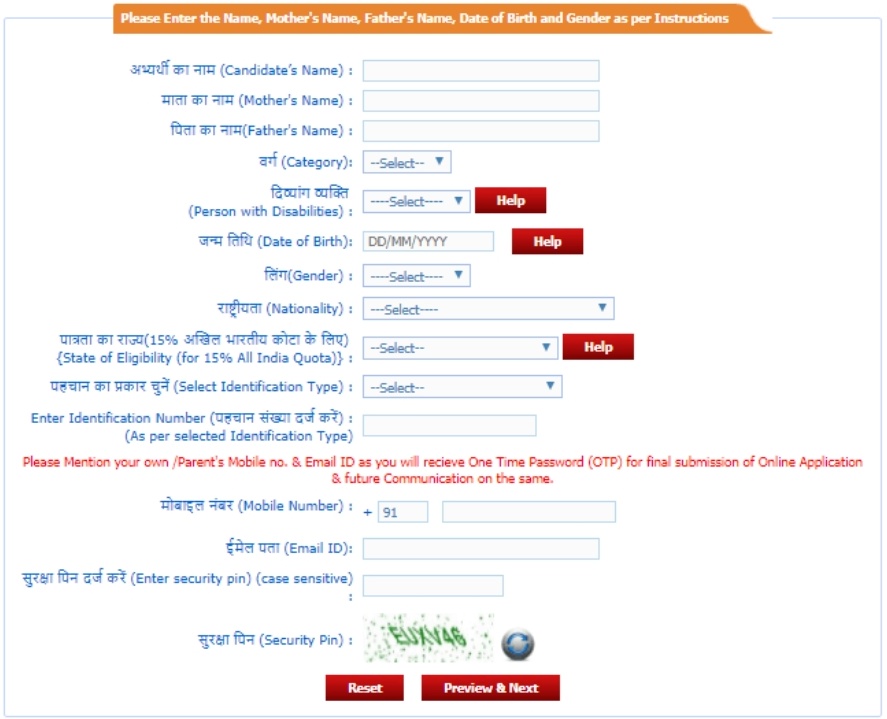
Step 2:
Note:
- The photographe should be of 10-100kb in .JPG format and it should have the candidate's name and date when there photo was taken
- The signature should be of 3-20kb and it should be in .JPG format and the signature must be in blue or black pen on a white paper.
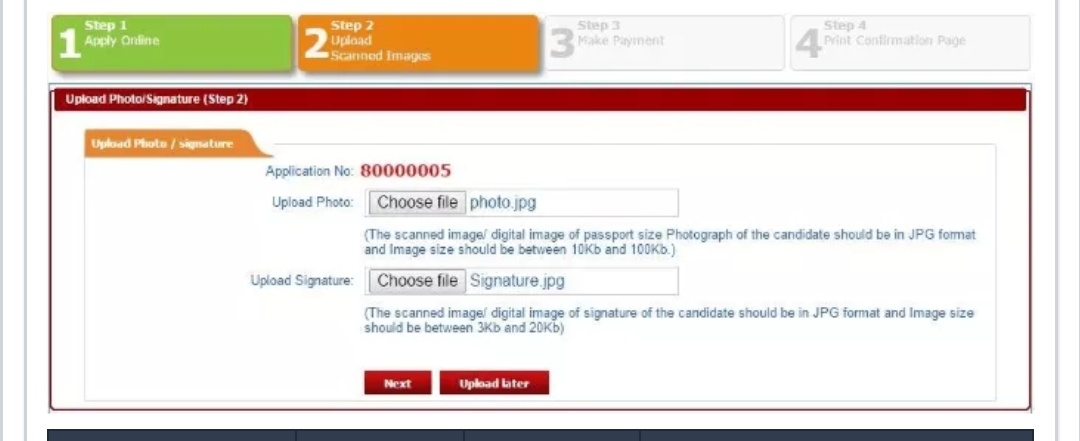
Step 3:
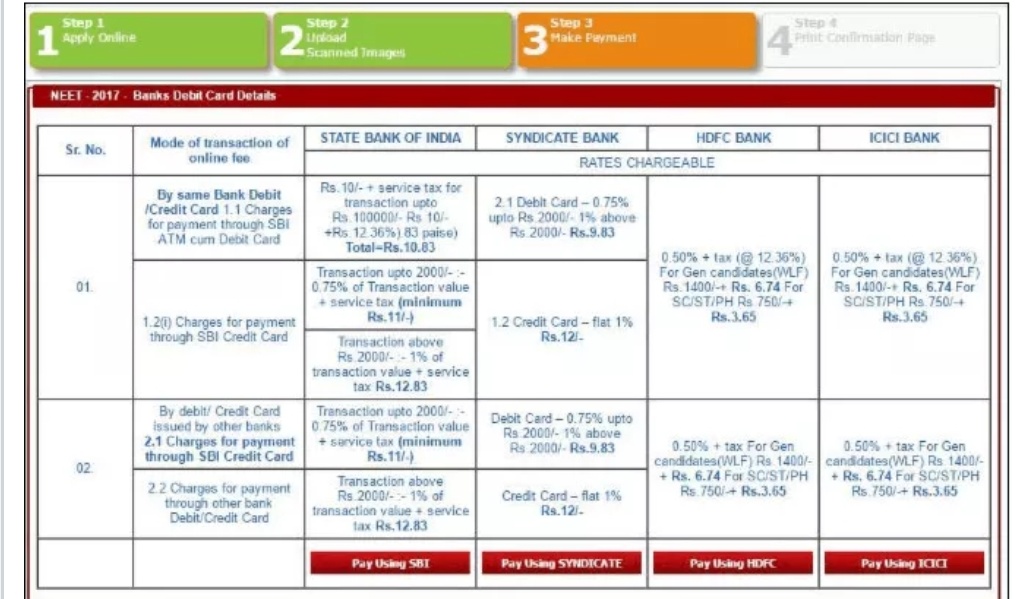
Eligibility
Under 85% quota:
85% of the seats are reserved under the state counseling. The eligibility criteria under 85% quota are:
The following can apply under state quota :
Reservation under 15% quota:
| Category | Reservation percentage |
| Scheduled Caste | 15% |
| Schedule Tribes | 7.5% |
| OBC (as per a central act, seats are reserved for OBC candidates in Central institutions) | 27% |
| Physically Handicapped* | 3% |
To get an admission via ALQ the candidates need to take part in the NEET counseling by MCC
Note: candidates from J&K are not eligible under this quota will have to submit a self declaration form.
NEET Eligibility criteria:
Candidates should have cleared their (10+2) with 50% marks in all subjects combined (Physics, chemistry and biology)
●50% aggregate for general quota ● 40% for SC/ST/OBC and ● 45% for PH general ● 40% for SC/ST/OBC handicapped
NEET Admit Card
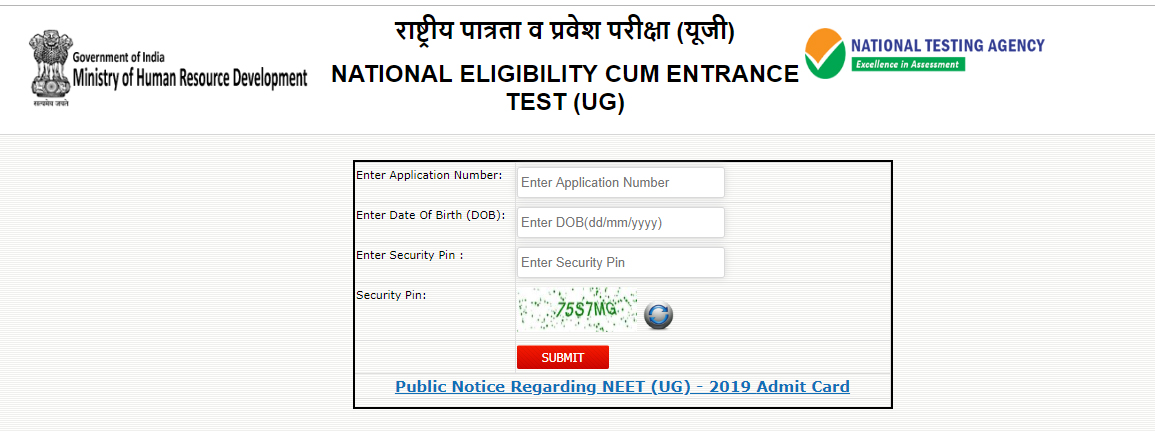
NEET Result
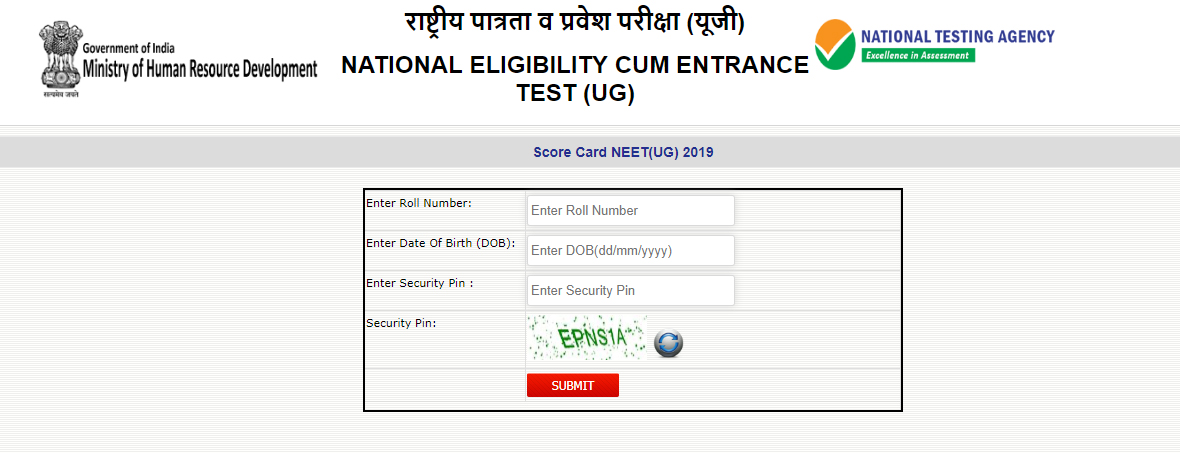
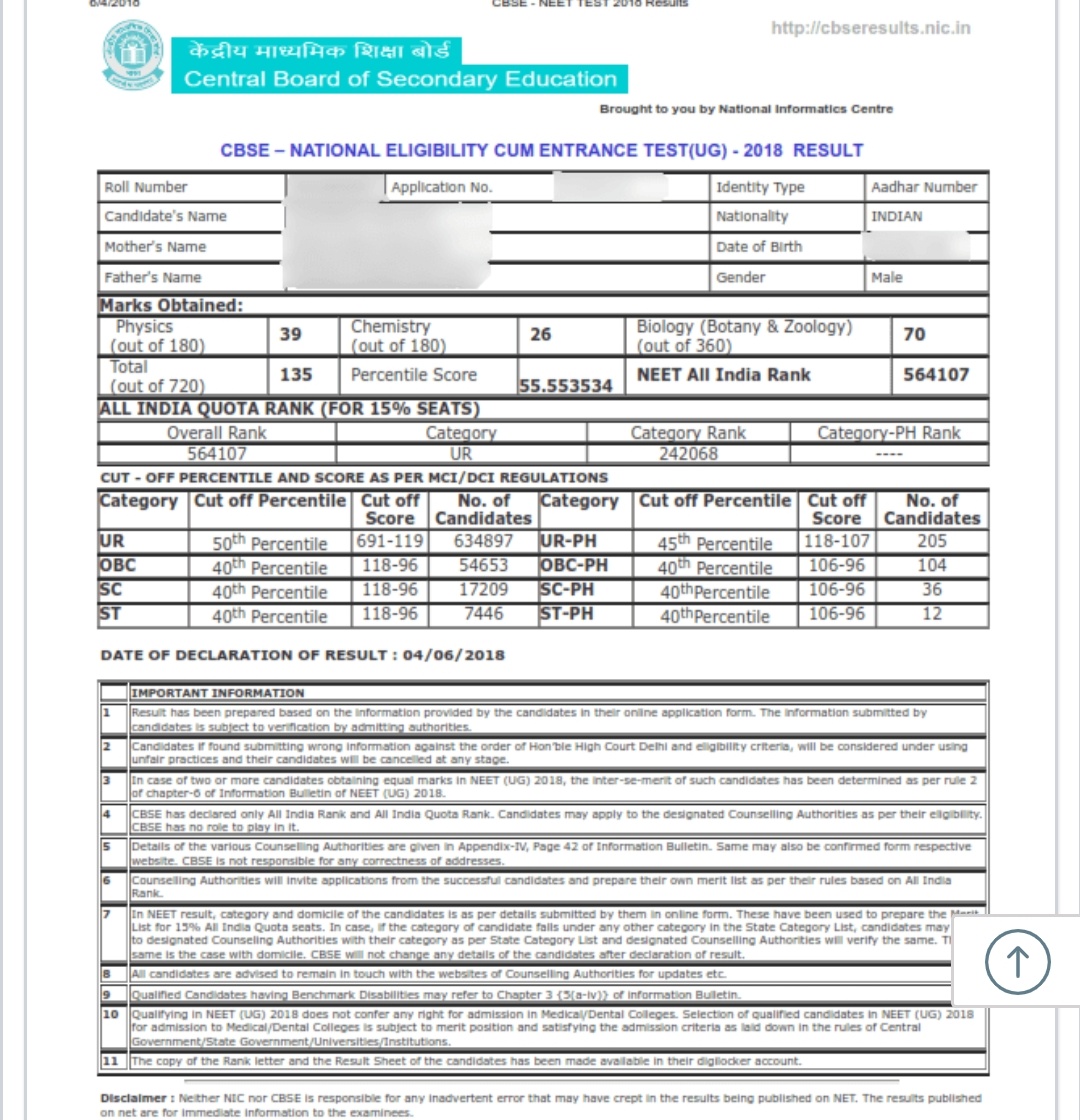
NEET Preparation Tips
A candidate gets 2 years for preparation for NEET.Ncert books are considered to be the Bible for this entrance test and 80% of the biology paper is pick up lines from the Ncert text book.
Alot of organic chemistry reactions also come from the Ncert text books only For Physics doing the formulas are very important as 65-70% of the paper will be based on the formulae.
Solving past year's papers is very important as it gives the candidate an idea about the way questions are going to be asked and if the candidate is able to solve them
Books For Refference
- Trueman’s Elementary Biology, Vol I & Vol II
- Companion Biology by K. Bhatti (Dinesh Publication)
- Objective Biology by Dinesh
- Neet Explorer by M.T.G. Publication
- Trueman's Objective Biology
- NCERT - Biology - Part 1 and Part 2
- Concepts of Physics by H.C. Verma
- NCERT - Physics - Part 1 and Part 2
- Physics for Medical Entrance Examinations by D.C. Pandey
- Organic, Inorganic and Physical Chemistry by O.P. Tandon
- NCERT Chemistry Books
- Objective Chemistry for NEET by R.K. Gupta
Frequently Asked Questions (FAQs)
| Question | Reply |
| How many students get registered for NEET? | About 15 lakhs students get registered for NEET. |
| What are the timings for NEET? | The timings are usually 2pm to 5pm |
| I have posted a photograph without my name and signature. Will it be rejected? | The authority has issued a notice that an image without a name, sign and white background will not be rejected. |
| Can I change my address in the application form? | Candidates can change the details from the correction window facility |
| When will the exam be conducted? | NEET exam is usually held in the first week of May. |
| Will admission to AIIMS and JIPMER, Puducherry be made through NEET (UG)? | No |
| Is there any change in the pattern of NEET (UG)? | No.The NEET (UG) – shall consist of one paper containing 180 objective type questions (four options with single correct answer) from Physics, Chemistry and Biology (Botany & Zoology). This will be a single exam in pen-and-paper mode. |
| Is it compulsory to take Maths if I want to appear in NEET (UG)? | Mathematics is not required for NEET (UG) |
